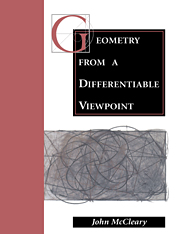Book contents
- Frontmatter
- Contents
- Introduction
- PART A Prelude and themes: Synthetic methods and results
- 1 Spherical geometry
- 2 Euclid
- 3 The theory of parallels
- 4 Non-Euclidean geometry I
- 5 Non-Euclidean geometry II
- PART B Development: Differential geometry
- PART C Recapitulation and coda
- Riemann's Habilitationsvortrag: On the hypotheses which lie at the foundations of geometry
- Appendix: Notes on selected exercises
- Bibliography
- Symbol index
- Name index
- Subject index
2 - Euclid
Published online by Cambridge University Press: 05 June 2012
- Frontmatter
- Contents
- Introduction
- PART A Prelude and themes: Synthetic methods and results
- 1 Spherical geometry
- 2 Euclid
- 3 The theory of parallels
- 4 Non-Euclidean geometry I
- 5 Non-Euclidean geometry II
- PART B Development: Differential geometry
- PART C Recapitulation and coda
- Riemann's Habilitationsvortrag: On the hypotheses which lie at the foundations of geometry
- Appendix: Notes on selected exercises
- Bibliography
- Symbol index
- Name index
- Subject index
Summary
There has never been, and till we see it we never shall believe that there can be, a system of geometry worthy of the name which has any material departures … from the plan laid down by Euclid.
A. DeMorgan (October 1848)The prehistory of geometry was a practical matter. It consisted of facts and rules that could be applied to determine the positions of the sun and stars or to measure land areas. Merchants brought these ideas from Egypt and Babylonia to ancient Greece where the prevailing ideas of systematic thought changed geometry from a tool to a deductive discipline of the mind. Centuries of contemplation and careful reorganization culminated in Euclid's Elements (Euclid 1956), whose thirteen surviving books summarized the mathematics of his day and influenced all subsequent generations.
The Elements proceeds by the axiomatic method – definitions and axioms are presented first, then propositions are shown to follow from these assumptions and from each other through logical deduction. When later mathematicians sought a model for the rigorous development of mathematical ideas, they turned to Euclid.
Let us begin with some definitions from the Elements:
(1) A point is that which has no part.
(2) A line is a breadthless length.
(3) The extremities of a line are points.
(4) A straight line is a line which lies evenly with the points on itself.
(5) A surface is that which has length and breadth only.
(6) The extremities of a surface are lines.
[…]
Information
- Type
- Chapter
- Information
- Geometry from a Differentiable Viewpoint , pp. 10 - 23Publisher: Cambridge University PressPrint publication year: 1995
